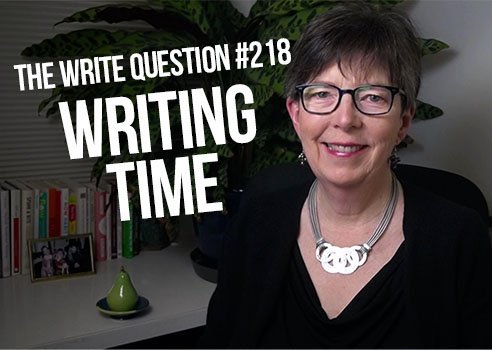Viewing time: 4 mins
The Write Question is a weekly video podcast all about writing. Today’s question? How do you plan your writing time? If you have a question you’d like me to answer you can email me, tweet me @pubcoach, or leave a message for me at the Skype account, The Write Question.
Transcript:
How do you plan your writing time? That’s the topic I’m addressing today in The Write Question. I’m Daphne Gray-Grant, the Publication Coach.
I have a question from Li Zhang, a writer based in Vienna, Austria. Here’s what she’s asked by email…
“If I plan to write for 10 minutes a day, do you expect that I should do only writing during that time? Or should I also be planning, researching and mind mapping? I’m worried that if I need to do everything within the 10 minutes, I won’t have nearly enough time. Also, when do you do proof-reading? Could you provide an example with a timeline of how you mean it?”
Thanks for your questions, Li. I’m happy to spell out the process I recommend for people who want to become writers.
The big problem is that many people try to write for too long or do too much at once. This almost inevitably leads to procrastination. And, sometimes, to despair.
But writing for a small amount of time — somewhere between five and 15 minutes — is much easier to accomplish. Then, once you’ve built a writing habit, you can extend that time, slowly and gradually, if you wish.
You are quite right to note that it’s pretty tough to accomplish planning, researching, mindmapping AND writing in 10 minutes. In fact, I don’t think that’s reasonable at all!
Instead, here’s what I suggest: do your mindmapping and writing first.
Then do those other tasks later on. Oh, and don’t start the timer until you actually begin writing.
Of course, you’ll also need to do planning and research. But you should do these tasks AFTER you’ve finished your 10 minutes of writing for the day. They should be in the service of what you’re going to write the NEXT day.
It might seem a bit tricky to research a day ahead, but I strongly suggest doing the writing first and the research second, because writing is the hardest job — and the easiest one to procrastinate about.
One task you didn’t mention, Li, which concerns me a little, is editing. This is a key step in the writing process and you don’t want to overlook it. Editing is the time when you take your first draft and work to improve it. I find that editing often takes twice as long as the writing, so be sure not to forget about it.
Proofreading is the very last step. It’s not editing. It’s just checking. You should do this AFTER you’ve finished editing, just before you hand in your work.
I hope this spells out my timeline, but if you need more clarification, I include a link to a video on reverse-engineering your projects in the show-notes below. I think you might find that helpful as well.
Finally, let me wrap up with the words of the American businessman Michael Altshuler: “The bad news is time flies. The good news is you’re the pilot.”
Li, starting small and planning your writing time is a really good way to begin any project. I commend you for recognizing that 10 minutes isn’t quite enough time to do everything, and I encourage you to add extra time for research after you’ve done your writing. Oh, and don’t forget about editing!
*
Viewers, if you have any writing-related questions, I’d be happy to do a video on them. Just send me a quick email, daphne@publicationcoach.com, or put a note in the comments section of this video.
And, if you’d like to learn more about how to make writing a happier and more rewarding process, check out my latest book Your Happy First Draft. I don’t sell it in bookstores or via Amazon. The only place you can buy it is my website, link below and in the show notes.


